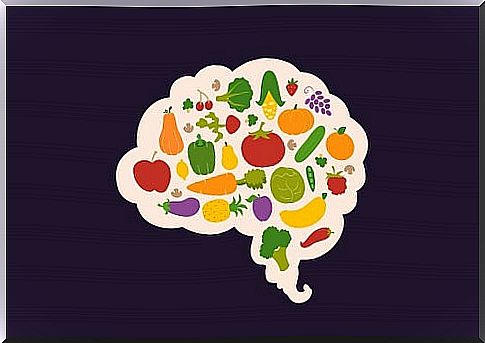Eating Habits And Depressive Symptoms

Numerous scientific studies have shown the relationship between eating habits and mood disorders. Depressive symptoms, in particular, were a key element in concluding the findings in favor of a nutrient-rich diet.
Amino acids such as iron, antioxidants and vitamins such as B12 influence cognitive and behavioral factors. The action of these nutrients affects not only the improvement of depressive symptoms, but also the decrease in the prevalence or severity of other disorders.
Eating habits throughout history
With the emergence of Homo Erectus over 1.8 million years ago, the variety and richness of food increased dramatically. The need appeared to feed a much more developed brain that burned 16 times more calories per gram.
For this reason, the human being began to introduce new methods of cooking food, as well as including fruits and vegetables through agriculture.
Nowadays, the difference in terms of food availability compared to prehistoric times is considerable. However, this does not mean that today’s situation is better than that of the past.

Nutrition and socio-economic level
Research data supports a strong association between food quality and mood disorders, particularly depressive symptoms.
In general, foods mainly associated with depressive symptoms are high in refined sugars and saturated fats (characteristic of ultra-processed foods).
It is therefore likely that people with lower incomes are more predisposed to their consumption. This is because ultra-processed foods are often cheaper than nutrient-rich or natural foods. It follows that people with fewer economic resources would be forced, in some way, to have to consume them.
The consequences can be severe in terms of mental health and depressive symptoms, but also physical health, leading to problems with obesity, diabetes, etc. Women also are more disadvantaged, since the diets deficient in nutrients such as iron, folate and calcium can lead to further damage of childbearing age.
Mental health and eating habits
Studies linking mental disorders with eating habits were conducted on population groups with severe dietary deficiencies. Therefore, the aforementioned studies cannot be extrapolated on an individual basis.
Vitamin supplementation in the psychiatric population has been observed to improve their condition, as well as that of people with nutrient absorption problems.
Science also indicates that although folic acid deficiency can be a cause of depression, people with folic acid may need higher doses of folic acid. Furthermore, the effects of this substance appear to be greater in the case of a subject with optimal nutrition.
Specifically, studies indicate that nutrients linked to various affective disorders, such as depression, are the following:
Omega 3
Omega 3 is one of the essential fatty acids. For this reason, a deficiency of the same can cause mood disturbances.
It is believed to be effective in ameliorating unipolar and bipolar depression. This fatty acid is found in fish and seafood, nuts and seeds, flaxseed oil, soybean oil, etc.
Folic acid and vitamin B12
Folic acid and vitamin B12 belong to the B vitamins and are present in a large number of foods. Low amounts of folate are associated with increased depressive symptoms, indicating that folate may be useful as an adjunct treatment for depression.
As for B12 or folic acid, the effectiveness of antidepressant drugs has been shown to be linked to the level of these vitamins.
The lower the levels, the lower the response to drug treatment. Folate and vitamin B12 can be found in foods such as nutritional yeast, dairy products, etc.

Magnesium and zinc
A diet lacking in magnesium in animals has been shown to increase behaviors related to depression and anxiety. Magnesium treatment can improve these behaviors. Quinoa, spinach, avocado, tofu, etc. are foods rich in magnesium.
Particular zinc deficiencies have also been observed in subjects with major depression. The use of zinc-rich supplements has been shown to be effective as an antidepressant therapy. There is also research in some animal samples in which zinc has been used as an antidepressant treatment.
In short, food plays an important role in people’s lives. Depending on the quality of this, in addition to the associated pace of life, the benefits can be substantial for both mental and physical health.









